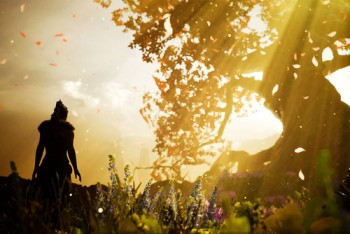
Tameem Antoniades, Ninja Theory co-founder and Chief Creative Ninja, discusses the inspiration and process behind the game.
What sparked the idea for Hellblade: Senua's Sacrifice and how did it change over time?
Heavenly Sword was our first big game and I felt like having another go at something like that as it was a game that crumbled under the weight of commercial pressures. But this time, it had to be a game that wasn’t encumbered by the realities of AAA development, a fantasy game that felt both original and grounded. It was when reading about people’s experience with psychosis that I was fascinated by what the mind is capable of creating. What if we could step into the shoes of someone who experiences psychosis and see the world through their eyes? Throughout development there was a sense that we were no longer making a game but finding the best way to represent a particular experience. The goal wasn’t to make “fun”, it was to define an experience that felt “true” and we were betting that the truth would be compelling. By the end of development, the game was so different to anything we had done before, that there was no way of knowing how it would be received. The release was a genuine moment of peril and fear for us.
Who is the game targeted at?
The game was not targeted at anyone but ourselves. We wanted to make something creative and interesting and not worry about target markets, demographics and monetisation. We would make our game with the resources we had and then sell it at a price that seemed fair to whatever niche was willing to buy it. It was an act of artistic rebellion. It is with irony that was a passion project, a game we purposely designed to be niche, has gained such universal acclaim and sales far beyond our expectations. It’s a lesson I’m not going to easily forget.
What research or collaborations did you undertake to inform the game?
How do you tackle a subject like psychotic mental illness without falling into tropes, stereotypes and caricatures? We very aware of my own ignorance of the subject so we asked for help. Ian Dodgeon from Wellcome approached us as did Professor Paul Fletcher, the students at Recovery College East and many more clinicians and people with direct lived experience of psychosis. They wanted to tell their stories through us and they risked their professional credibility in doing so. It was a great collaboration over the three years of development and a perfect marriage of evidence-based science, lived experience and interactive art. Research and lived experience are vastly underrated and I couldn’t be prouder of what we have achieved as a collective whole.





